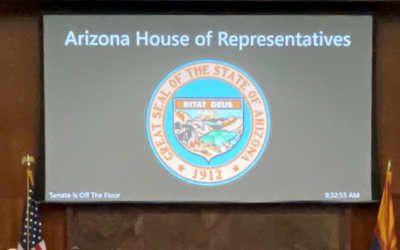By Corinne Murdock |
On Wednesday, the Arizona House voted to expel State Rep. Liz Harris (R-LD13) over findings that she lied to the Ethics Committee. Harris’ seat is now vacant; her district’s Republican precinct committee members have five days to nominate three candidates to replace her.
House Speaker Ben Toma (R-LD27) introduced the resolution, HR 2003, to expel Harris.
The resolution passed 46 to 13. The 13 members who opposed Harris’ expulsion, including Harris herself, were Reps. Neal Carter (R-LD15), Joseph Chaplik (R-LD03), David Cook (R-LD07), Gail Griffin (R-LD19), Justin Heap (R-LD10), Rachel Jones (R-LD17), Alex Kolodin (R-LD03), Cory McGarr (R-LD17), Barbara Parker (R-LD10), Jacqueline Parker (R-LD15), Kevin Payne (R-LD27), and Austin Smith (R-LD29).
Seven of the 12 Arizona Freedom Caucus members voted against Harris’ expulsion.
Smith said that he felt that the voters should decide on how to handle Harris, not lawmakers.
Amid a swarm of reporters on her way out of the capitol, Harris called the report “a lie,” and insisted that God knew the truth.
Issues with Harris arose after a February joint hearing on election integrity. Harris invited a woman to testify named Jacqueline Breger, who alleged a number of individuals engaged in criminal conduct including money laundering, drug trafficking and sales, public corruption, and public official bribery in addition to election fraud. Breger testified that these alleged crimes were overseen by the Church of Jesus Christ of Latter-Day Saints, most commonly referred to as the Mormon church, which included current Arizona legislators.
Following the joint hearing, State Rep. Stephanie Stahl Hamilton (D-LD21) filed a complaint against Harris. Stahl Hamilton alleged that Harris embarrassed the House and put it in disrepute, as well as violated House Rule 1, which prohibits impugning other members.
The House Ethics Committee convened twice last month to review the accusations against Harris. According to their report issued earlier this week, Breger inappropriately levied criminal allegations; Harris failed to comply with internal House deadlines on presentation material disclosure ahead of the joint hearing; and that Harris engaged in disorderly behavior in violation of House Rule 1.
“By her own admission, Representative Harris had obvious influence and significant control over the Joint Hearing as its organizer and facilitator,” stated the report. “[T]he totality of the evidence shows that Representative Harris used her elected position to provide Breger with a legislative platform as a substitute for criminal court.”
According to the committee report, Harris indicated in a text to Breger after the joint hearing that the hearing had played out according to their plan.
“It was all how it was intended to be,” wrote Harris.
The Ethics Committee also determined that Harris didn’t disavow Breger’s testimony and had eroded public trust with her actions. Harris also claimed to not have known Breger’s allegations ahead of the joint hearing; the committee report rejected that claim.
“Representative Harris violated the inherent obligation to protect the integrity of the House of Representatives and used her elected position to provide Ms. Breger with a legislative platform as a substitute for a criminal court,” stated the resolution.
Corinne Murdock is a reporter for AZ Free News. Follow her latest on Twitter, or email tips to corinne@azfreenews.com.








